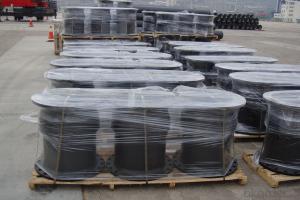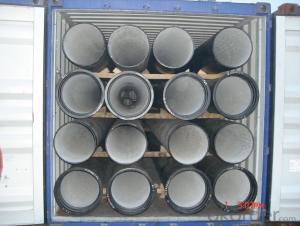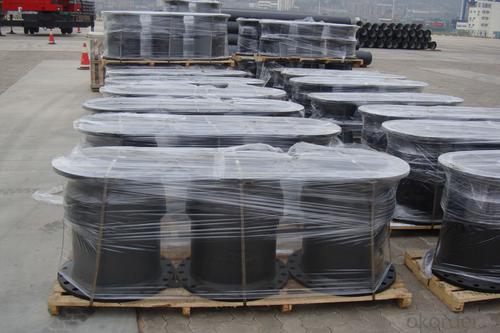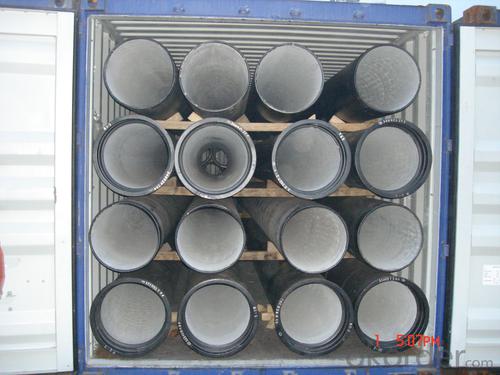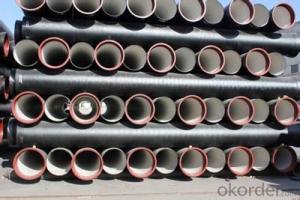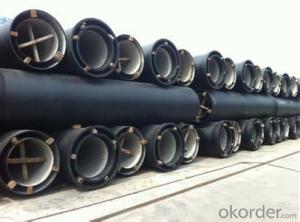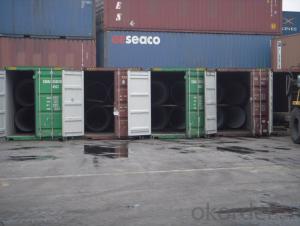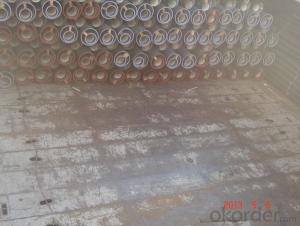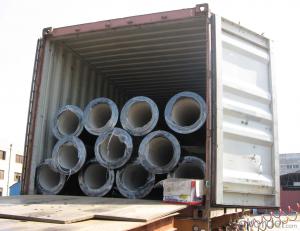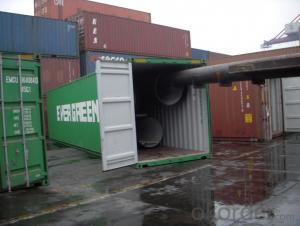DUCTILE IRON PIPES C Class DN800
- Loading Port:
- China Main Port
- Payment Terms:
- TT OR LC
- Min Order Qty:
- -
- Supply Capability:
- -
OKorder Service Pledge
OKorder Financial Service
You Might Also Like
Ductile Iron Cast Pipe is without any defects compare with tradition casting tech, which has many advantages particularly as follow:
(1) High density. In the "vertical upward casting" process, the melt iron of centre liquid column in center crystallizer is continuously feeding for volume shrinkage caused by condensation tube at outer circumference , which lead to be free of shrinkage porosity.
(2) High purity. When melt iron pouring, the mixed impurities such as gas, dross, sand grain which are lighter than melt iron could be eliminated at furnace mouth, its impossible to enter into the crystallizer through the channel, so the melt iron into the crystallizer is very pure.
(3) Strength with toughness. The cooling speed provided by continuous crystallizer is 30 times than sand casting and 5 times than centrifugal casting, and doesn't produce white iron, the eutectic cell volume of continuous cast iron is one eighth to one tenth compare with traditional cast iron. The density of graphite nodule in ductile iron can reach 300-700 pcs/mm2. Therefore, all reason above improve the strength and toughness of continuous cast iron.
(4) Free machining. The high speed cooling make the hardening phase (such as boride, steadite) not appear like reticular, massive or thick, but diffuse like fish bone and pane in shape, moreover, there are tiny graphite flakes inlaid hardening phase. It's free machining in BrinellHardness the range of 250-300HB. However, the Brinell Hardness of 250 is top limit to common metal materials.
(5) Uniform composition of tube wall. The convection mixing of liquid column caused by marching type drawing in crystallizer make the composition of tube wall well-distributed, and concentration gradient very little.
(6) High productivity. To the wall thickness of tube under 10mm, the speed of continuous casting is 1 meter/min, to the wall thickness of tube under 20mm, the speed of continuous casting is 0.5 meter/min, which is high efficiency that centrifugal or other casting tech couldn't reach.
- Q: Are ductile iron pipes suitable for power plant applications?
- Yes, ductile iron pipes are suitable for power plant applications. Ductile iron is a type of cast iron that has enhanced strength, durability, and flexibility compared to traditional cast iron pipes. These properties make ductile iron pipes ideal for power plant applications where they are exposed to high pressure, extreme temperatures, and corrosive environments. Power plants often require a reliable and robust piping system to transport various fluids such as water, steam, and chemicals. Ductile iron pipes have high tensile strength and can withstand high pressure, ensuring the safe and efficient flow of these fluids within a power plant. Their ability to handle high-pressure steam makes them particularly suitable for power generation applications. Additionally, ductile iron pipes have excellent resistance to corrosion, which is crucial in power plants where many fluids can be highly corrosive. The internal and external linings of these pipes protect them from corrosion, ensuring a longer service life and reducing maintenance costs. This corrosion resistance also makes them suitable for transporting chemicals and wastewater within a power plant. Another benefit of ductile iron pipes is their ability to withstand extreme temperatures. Power plants often operate at high temperatures, and ductile iron pipes can handle these conditions without compromising their structural integrity. They have a high melting point and can resist thermal expansion and contraction, making them suitable for applications involving hot fluids and steam. Furthermore, ductile iron pipes are cost-effective compared to other materials commonly used in power plants, such as stainless steel or carbon steel. They offer a balance between performance and cost, making them an attractive choice for power plant applications. In conclusion, ductile iron pipes are well-suited for power plant applications due to their strength, durability, flexibility, corrosion resistance, and ability to withstand high pressures and extreme temperatures. Their cost-effectiveness further adds to their suitability for power plant piping systems.
- Q: What is the expected thermal expansion coefficient of ductile iron pipes?
- The expected thermal expansion coefficient of ductile iron pipes typically ranges from 10.8 to 12.2 x 10^-6 per degree Celsius.
- Q: What is the expected fatigue life of ductile iron pipes under cyclic loading?
- The expected fatigue life of ductile iron pipes under cyclic loading can vary depending on various factors such as the material properties, design considerations, loading conditions, and maintenance practices. However, ductile iron pipes are generally known for their excellent fatigue resistance, and when properly designed and installed, they can have a long fatigue life of several decades or more.
- Q: Does the cast iron pipe need separate corrosion protection?
- Ductile iron is characterized by its ease of decay and deformation, so if it is not a particular requirement, there is no need to do it alone
- Q: How does ductile iron pipe perform in areas with high groundwater salinity?
- Due to its inherent resistance to corrosion, ductile iron pipe is highly effective in areas with high groundwater salinity. The presence of elevated levels of salt and minerals in the groundwater can lead to the corrosion and deterioration of certain materials, but ductile iron is highly resilient to this type of corrosion. Its composition and manufacturing process make it less susceptible to damage from corrosive elements found in high salinity water. The primary reason for the corrosion resistance of ductile iron pipe lies in its protective iron oxide coating, which naturally forms on both the interior and exterior surfaces of the pipe. This coating acts as a barrier, preventing direct contact between the pipe and the corrosive elements present in the groundwater. Additionally, ductile iron pipes are often lined with cement mortar or a protective epoxy coating, further enhancing their resistance to corrosion and providing an extra layer of protection. Moreover, ductile iron pipe boasts an extended lifespan, often surpassing 100 years, making it an ideal choice for areas with high groundwater salinity. Its durability and resistance to corrosion ensure that it can withstand the harsh conditions associated with high salinity environments, minimizing the frequency of repairs or replacements. In conclusion, ductile iron pipe is an exceptional option for areas with high groundwater salinity due to its corrosion resistance properties. Its protective iron oxide coating, along with optional linings, offers a dependable and long-lasting solution, guaranteeing the integrity and performance of the pipe system even in demanding environments.
- Q: What is the expected bending stress capacity of ductile iron pipes?
- The expected bending stress capacity of ductile iron pipes can vary depending on various factors such as the pipe's diameter, wall thickness, and the specific grade of ductile iron used. However, generally speaking, ductile iron pipes have a high bending stress capacity compared to other pipe materials. Ductile iron pipes are known for their high tensile strength and flexibility, making them capable of withstanding significant bending stresses. The exact bending stress capacity can be determined through rigorous testing and analysis by considering factors like the pipe's mechanical properties, dimensions, and the maximum allowable deflection. It is important to note that the bending stress capacity of ductile iron pipes should be evaluated in accordance with industry standards and guidelines. These may include standards such as the American Water Works Association (AWWA) C150 or International Organization for Standardization (ISO) 2531, which provide specifications and testing methods for ductile iron pipes. Ultimately, the expected bending stress capacity of ductile iron pipes is determined by several factors and should be assessed based on the specific requirements of the application, considering industry standards and guidelines for accurate and reliable results.
- Q: Are ductile iron pipes available for cutting and are there any relevant specifications?
- You can cut, there should be no specification requirements, as long as you can use, in line with the needs of the project can
- Q: How much is the installation cost of the ductile iron tube?
- Ductile iron pipes mainly called centrifugal ductile iron pipe, it has the properties of nature, iron and steel, excellent corrosion resistance, good ductility, good sealing effect, simple installation, mainly for municipal, industrial and mining enterprises, water supply, gas, oil etc..
- Q: How are ductile iron pipes protected against stray electrical currents?
- To safeguard water and sewer systems, ductile iron pipes are shielded from stray electrical currents through a technique called cathodic protection. This process entails the application of a low-voltage direct current (DC) to the pipes, generating a defensive electrical field around them. To achieve cathodic protection, sacrificial anodes or impressed current systems are installed near the ductile iron pipes. Sacrificial anodes, composed of a more electrically active metal like zinc or magnesium, are connected to the pipes and act as the electrical current source. Over time, these anodes corrode, sacrificing themselves to shield the pipes from corrosion caused by stray electrical currents. However, impressed current systems utilize an external power source to supply the protective electrical current. Rectifiers are employed to convert alternating current (AC) to direct current (DC), which is then administered to the pipes through anodes. This approach provides greater control over the amount of current applied, ensuring optimal protection. In both scenarios, the electrical current flowing through the sacrificial anodes or impressed current systems establishes a protective barrier around the ductile iron pipes. This barrier impedes the flow of stray electrical currents through the pipes, thus diminishing the risk of corrosion and prolonging the infrastructure's lifespan. Regular monitoring and maintenance of the cathodic protection system are crucial to uphold its efficacy. This involves inspecting the anodes, assessing the levels of electrical current, and making any necessary adjustments or replacements to maintain the desired level of protection. To summarize, cathodic protection is a dependable and widely utilized method for safeguarding ductile iron pipes against stray electrical currents. By preserving the integrity and longevity of water and sewer systems, it plays a vital role in ensuring their functionality.
- Q: How are ductile iron pipes protected from external damage?
- Ductile iron pipes are protected from external damage through the application of protective coatings. These coatings act as a barrier, shielding the pipes from corrosion and other forms of external damage. Additionally, the pipes may be encased in concrete or installed in a casing pipe to provide further protection against external forces and impacts.
Send your message to us
DUCTILE IRON PIPES C Class DN800
- Loading Port:
- China Main Port
- Payment Terms:
- TT OR LC
- Min Order Qty:
- -
- Supply Capability:
- -
OKorder Service Pledge
OKorder Financial Service
Similar products
Hot products
Hot Searches
Related keywords
